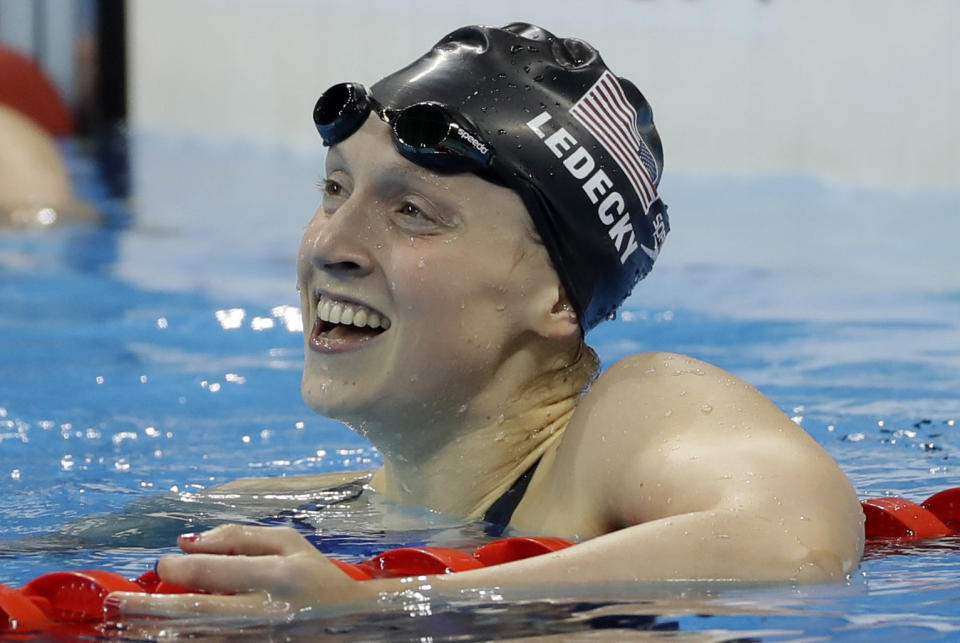How Katie Ledecky stopped herself from vomiting and won another gold
RIO DE JANEIRO – Katie Ledecky almost puked in the middle of an Olympic pool Tuesday night. The feeling hit her with 25 meters left in the 200-meter freestyle race, the one distance that sets her nerves aflutter. This wasn’t butterflies, though. It was her body telling her enough, her internal combustion engine redlining, the previous 175 meters and the previous four days having taxed her so deeply she came up for a breath and instead unleashed a burp that nearly called for a cleanup on Lane 5.
And it was at that point, with world champion Sarah Sjostrom gaining, with another gold medal slipping away, that Katie Ledecky did what Katie Ledecky does. Which is to say she ignored all external factors – and, in this case, internal ones as well – and powered her way atop another podium.
Gold medals never get old, something to which Michael Phelps surely can attest, but the one Ledecky earned Tuesday night by holding off Sjostrom to win the 200 free felt different than her victory in the 400-meter freestyle earlier this week or the 800-meter freestyle as a 15-year-old in London four years ago.
Those events take greatest advantage of Ledecky’s natural gift: the combination of a marathoner’s endurance and a sprinter’s urgency. The 200 is an in-between race, too long for a sprinter and too fast for a middle-distance swimmer, and it pitted the former in Sjostrom against the latter in Ledecky. For Ledecky to touch the wall in 1:53.73, less than a quarter of a second shy of the Olympic record and .35 seconds ahead of Sjostrom, cemented her place in history, especially if she wins the 800 as expected Friday.

Only American Debbie Meyer has pulled a 200-400-800 triple in one Olympics. And for some context, Meyer’s 200 came in 2:10.5, nearly 17 seconds slower than Ledecky’s.
“She’s the queen of freestyle,” Sjostrom said.
She said this with no malice. Just respect and awe and admiration and the many other feelings Ledecky inspires. Her star turn at the Rio Games, with two gold medals and a silver in the 4×100-meter relay, is complete; her ability to make it even more luminescent remains a distinct possibility.
For three years, Ledecky has trained with her eyes on Rio – on these moments in which she hasn’t caved, either to the pressure or the physical exertion. Ledecky’s longtime coach, Bruce Gemmell, has seen ralph-prone Ledecky before. Over the winter, as the United States’ swim team was training, one male swimmer, after a session, said: “That was so hard I feel like I’m going to throw up.”
Ledecky’s reply: “I feel like that about three times a week.”
“I’ve come pretty close in practice a few times, so I’m pretty used to it,” she said. “I know I can get through it. It’s almost like you get mad when that happens, and I kind of swim better when I’m mad.”
Well, yeah, vomit doesn’t often dovetail with feelings of happiness. Still, if that is Ledecky’s performance-enhancing drug, perhaps she ought wear herself to the point of exhaustion before every race and allow endorphins and adrenaline and the body’s wonders to carry her past it.
If Katinka Hosszu is the Iron Lady, Katie Ledecky was the Iron Stomach. She forged past the stomach issues that crop up on her competitors, too. “Definitely on that last turn I often do feel like I’m going to throw up,” said Australian Emma McKeon, who took bronze. She kicked legs that felt like the weight of the world on top of the previous six laps. “It’s mainly the legs in the last 50 that really sting,” McKeon said. “You feel like you stop moving.”
Ledecky couldn’t, wouldn’t, not when winning the 200 in Rio was one of her goals, not with the triple – and another potential gold in the 4×200-meter freestyle race – likely. Sjostrom caught up to Ledecky, maybe even pulled ahead for a moment, and Ledecky had no clue that as she needed to barf she was about to lose the race.
Because she swims distances, and because she’s generally so far ahead of the competition, Ledecky breathes only on her right side. In shorter races, this is a huge disadvantage; during the last 50, Sjostrom was on her left, and Ledecky knew nothing of her position.
“The 200 free is such a more stressful event for me than the 400 or the 800,” Ledecky said. “I can’t really settle into my rhythm. It’s one mistake and you’re done.”
She made no such mistakes. Ledecky surged, Sjostrom faded – “I didn’t think I was going to be as close as I was,” she said, “I was actually surprised” – and the luck of the U.S. men’s basketball team cast itself upon Ledecky again. The 2012 team happened to go to the London Aquatics Centre the night she swam her lone race in 2012. On Tuesday, it came to the Olympic Aquatics Stadium here for Ledecky and Phelps and the three golds they combined to take home.
There was good karma, and that extended down to Ledecky’s gastrointestinal system. When she saw her name atop the scoreboard, another gold to take home, the queasiness all disappeared. There was no mess in the pool, aside from the shattered hope Ledecky left in her wake. If there were illusions she was vulnerable in freestyle, Ledecky shattered them once and for all Tuesday.
Pushed to her breaking point, and even past it, Katie Ledecky didn’t turn to a million pieces. She did something different altogether, something rare for any athlete. She got better. Long live the queen.
More Olympic coverage from Yahoo Sports:


